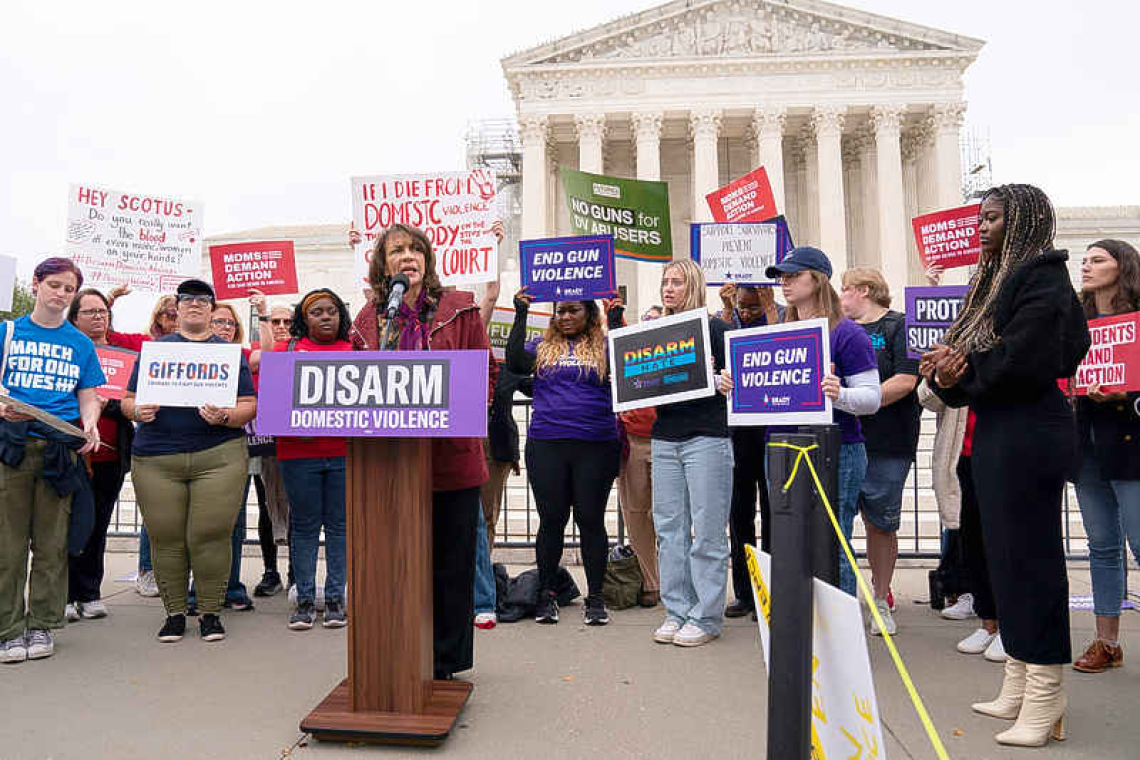WASHINGTON--U.S. Supreme Court justices on Tuesday appeared inclined to uphold the legality of a federal law that makes it a crime for people under domestic violence restraining orders to have guns in the latest major case to test the willingness of its conservative majority to further expand gun rights.
The justices heard arguments in an appeal by President Joe Biden's administration of a lower court's ruling striking down the law - intended to protect victims of domestic abuse - as a violation of the U.S. Constitution's Second Amendment right to "keep and bear arms." The New Orleans-based 5th U.S. Circuit Court of Appeals concluded that the measure failed a stringent test set by the Supreme Court in a 2022 ruling that required gun laws to be "consistent with the nation's historical tradition of firearm regulation" in order to survive a Second Amendment challenge. Some of the conservative justices, who hold a 6-3 majority, questioned the scope of the administration's argument that, under the Second Amendment, people who are not "law-abiding and responsible" - categories that include domestic abusers - may be barred from possessing guns. Some of their questions, however, signalled openness to finding the law in harmony with the Second Amendment by applying a standard that would disarm people deemed dangerous, as opposed to merely irresponsible. Conservative Chief Justice John Roberts focused on the word "responsible," suggesting it was too broad. "I mean, not taking your recycling to the curb on Thursdays, if it's a serious problem it's irresponsible," Roberts said. Solicitor General Elizabeth Prelogar, representing the administration, told Roberts the term "not responsible" is the standard the court itself articulated for firearms restrictions in three major gun rights rulings in the past 15 years and is "intrinsically tied to the danger you would present if you had access to firearms." Prelogar argued that the law fits within the nation's historical tradition of taking guns from people who have committed crimes or whose access to guns poses a danger - "for example, loyalists, rebels, minors, individuals with mental illness, felons and drug addicts." The case involves Zackey Rahimi, a Texas man who pleaded guilty to illegally possessing guns in violation of this law while subject to a restraining order for assaulting his girlfriend in a parking lot and later threatening to shoot her. Police found the guns while searching his residence in connection with at least five shootings. Advocacy groups have cited studies showing the presence of a gun increases the likelihood a domestic abuse incident will turn deadly. Prelogar also made the point. "Guns and domestic abuse are a deadly combination," Prelogar told the justices. "As this court has said, all too often, the only difference between a battered woman and a dead woman is the presence of a gun. Armed abusers also pose grave danger to police officers responding to domestic violence calls and to the public at large, as Zackey Rahimi's own conduct shows." "You don't have any doubt that your client's a dangerous person, do you?" Roberts asked attorney Matthew Wright, the federal public defender representing Rahimi. Wright wondered what a "dangerous person" means. "I mean, someone who's shooting, you know, at people - that's a good start," Roberts replied, eliciting courtroom laughter. Conservative Justice Amy Coney Barrett asked Prelogar whether the court needed to use "law-abiding and responsible" as the relevant test "given some of the ambiguities in that phrase." Barrett asked, "Could I just say, it's dangerousness?" Liberal justice Elena Kagan told Wright that ruling in Rahimi's favour could lead to other gun curbs being invalidated, undermining public safety. "It just seems to me that your argument applies to a wide variety of disarming actions - bans, what have you - that we take for granted now because it's so obvious that people who have guns pose a great danger to others, and you don't give guns to people who have the kind of history of domestic violence that your client has or to the mentally ill," Kagan said.







